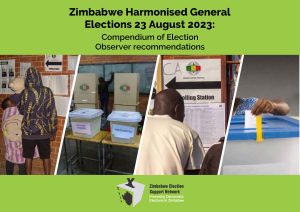There is need for an enabling political environment, which supports the holding of free, fair and credible elections.
Statutes as the Public Order and Security Act (POSA) and the Access to Information and Protection of Privacy Act (AIPPA) reinforces the existing political environment.
There is need for an enforceable Electoral Code of Conduct for traditional leaders so as to ensure that Traditional leaders discharge their duties in a non-partisan manner.
Assessment:
The political environment remains in a state of flux, and unconducive to the holding of credible elections. The conflation of the state and ruling party continues to deepen as recently illustrated by the range of elaborate strategies that the party in government has employed to weaken the main opposition political party. The strategy includes co-optation, repression and legitimation. For instance, on 17 May 2019, the government launched the Political Actors Dialogue (POLAD), which comprised some of the parties that contested the 2018 presidential elections. While the main opposition political party the MDC Alliance did not join, the majority of political parties in the opposition were co-opted under this arrangement. In a move that further weakened the main opposition political party, the Government, through the judiciary gave legitimacy to a faction of the MDC. The MDC-T was given a favourable judgement in its dispute with MDC-Alliance leader, Nelson Chamisa where it argued that Chamisa’s appointment as vice president and his subsequent rise as president of the MDC-T party was illegal and unconstitutional. Armed with this judgement the faction of the MDC has proceeded to recall MPs that were elected under the MDC-Alliance party. Consequently the oversight and legislative power of Parliament has been weakened, as the ruling party’s dominance in Parliament is unchecked, increasing the likelihood of bills being passed without adequate scrutiny.
Some of changes to legislation that regulate the enjoyment of civil and political rights have been changed. The Public Order and Security Act which was replaced by the Maintenance of Peace and Order (MOPA) Bill is a case in point. Although the Bill became an Act on 14 November 2019, some stakeholders view it as a missed opportunity as some of the provisions in the new law were considered more repressive than those in the POSA which it sought to replace. Some in the opposition have even likened the MOPA to the South African Apartheid era law, the Regulation of Public Gathering Act (No. 205 of 1993)[1]. Media Institute of Southern Africa-Zimbabwe is of the view that MOPA retains and in some instances adds to the restrictive provisions that were in POSA[2]. In addition the MOPA was passed without addressing the various adverse comments that were raised by the Parliamentary Legal Committee (PLC) on the Bill, which in the view of the PLC were in conflict with the Constitution[3].
The Independent complaints mechanism that the members of the public can report human rights abuses by members of the security services has not yet been instituted, seven years after the Constitution was enacted and five years after the lodging of a constitutional application calling on the Government to gazette a Bill to set up the Complaints Mechanism envisaged by section 210 of the Constitution. However, recent developments suggest there could be movement on this issues as Cabinet approved the Zimbabwe Independent Complaints Commission Bill, in November 2020[4]. It remains to be seen if the provisions in this Bill sufficiently capture the essence of provisions of section 210 of the Constitution.
On the other hand the government created the National Peace and Reconciliation Commission (NPRC) whose mandate is, among other things, “to develop mechanisms for early detection of areas of potential conflicts and disputes, and to take appropriate preventive measures”[5] the NPCRC is yet do develop the early warning system, with efforts to hire a lead consultant to assists with this process commencing as recently as August 2020[6]. NPRC was also required to developed procedures and institutions at national level to facilitate dialogue among political parties, communities, organisations and other groups, in order to prevent conflicts and disputes arising in the future. Perhaps institutions like POLAD ought to have been created and facilitated by the NPRC. In addition the Commission has not mediated in disputes between various rural communities and commercial entities for instance[7].
Download Full Report
[2] https://zimbabwe.misa.org/wp-content/uploads/sites/13/2020/04/MISA-Zimbabwe-Annual-Report-2019.pdf
[3] http://kubatana.net/2019/07/29/parliamentary-legal-committee-adverse-report-on-mopa-bill-watch-39-2019/
[4] https://www.chronicle.co.zw/cabinet-approves-zimbabwe-independent-complaints-bill/
[5] http://www.nprc.org.zw/mandate/
[6] https://twitter.com/NPRCZim/status/1293911067312050177
[7] http://kubatana.net/2020/08/17/rise-in-forced-eviction-cases-in-masvingo-province/

